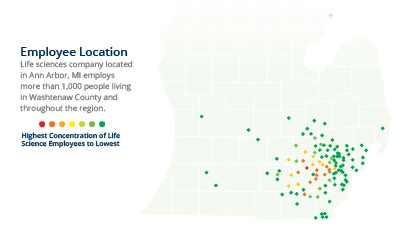With experience, education, and diversity, the greater Ann Arbor region is home to a strong and growing workforce. Communities in the greater Ann Arbor region may have been built around farming and manufacturing, but they have expanded and adapted to include technology and mobility.
| 76,052 |
| Advanced Manufacturing Professionals |
| Source: U.S. Census Bureau |
| 300 |
| R&D Companies |
| Source: Michigan Economic Development Corporation |
| 21,990 |
| of Technology Professionals |
| Source: U.S. Bureau of Labor and Statistics |
| #1 |
| America’s Highest Concentration of Engineers |
| Source: Michigan Economic Development Corporation |
“That’s what’s fun about being in Michigan too. Having that workforce that’s hardworking, and fun, and passionate.”
David Yancho, VP Armor Protective Packaging
Learn more about Armor Protective Packaging
The greater Ann Arbor region is a thriving and growing place in Michigan, the comeback state. Our population has increased 6% within the last five years, and many people are moving to the region, both in state, from the United States, and from around the globe.
| 5,144 |
| people have migrated to region in last 5 years |

With the population growth in the greater Ann Arbor region, it is an exciting time to join the community and help determine the emerging new shape it forms in the future.
If you have any questions about these Michigan taxes and policies, please contact the Greater Ann Arbor Region. We’re here to assist you.
Michigan’s workers’ compensation insurance is in an “open competition” system. Rates are set by the market, so businesses can take their pick from among more than 200 workman’s comp insurance carriers.
This new law went into effect in March of 2013. While not prohibiting unions, it makes it illegal to require that an employee pay dues or service fees to a union as a condition of obtaining or continuing employment.
Michigan businesses pay unemployment insurance on the first $9,000 of wages paid to each worker in a calendar year, and the percentage required varies based on a business’ experience rating. New employers pay a rate of 2.7 percent, while more established business can pay as low as .06 percent.
Michigan has eliminated personal property taxes, which helps manufacturing businesses when they have to make capital investments in machinery. Michigan also does not allow local sales taxes.
Michigan levies a Single Business Tax (SBT), which is a modified value-added tax (VAT). The rate is 6.00%, and there is an additional modified gross receipts tax at a rate of 0.8%. For 2015, The Tax Foundation ranked Michigan’s corporate tax as 10th best in the nation.
Michigan’s personal income tax rate is one of the lowest in the nation – a flat 4.25% tax rate that is scheduled to decline in the next few years.
The state sales tax is 6% on sales of tangible goods. No local sales taxes are allowed.
Michigan has no inventory tax.
Agriculture Operations & Related Sciences
| 19 |
| programs |
| 1,293 |
| students |
Computer Programming, Information Resources, CS Networking, Sys Admin
| 27 |
| programs |
| 1,968 |
| students |
Science, Technology, Engineering & Mathematics
| 15 |
| programs |
| 1,049 |
| students |
Machine Tool, Machinist, Welding
| 16 |
| programs |
| 649 |
| students |
Source: Michigan Department of Education
Want to learn more about our talented workforce, employment costs, or taxes? We can connect you with the right information and professionals to help you move to or expand in the greater Ann Arbor region.